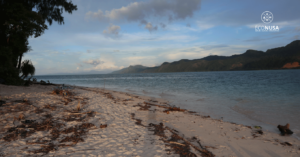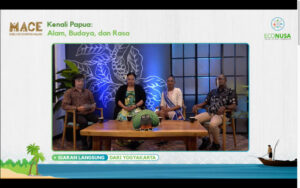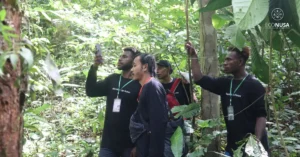
Ecotourism should be based on the indigenous community given the fact that they have better knowledge on their nature potentials, including culture, culinary and handicrafts. Muhammad Farid, Econusa Foundation’s Program Director, made this statement over the sidelines of Ecotourism Workshop across the Land of Papua on 16-17 February in Sorong, West Papua.
“We are delighted to see prosperous community through their natural resources management. Ecotourism program is one forms of community resilience that in a way could support the efforts to extensive protection of forests and sea ecosystems ,” said Farid.
The workshop was officially opened by the West Papua Province’s Secretary of Culture and Tourism Office, Ruland Sarwom. Around 17 indigenous Papuan peoples from 10 regencies attended the workshop. They presented 12 local initiatives as ecotourism. They even claimed ecotourism such as birdwatching could help preserve about 300,000 hectares of primary forests.
The workshop tried to bring together all ecotourism management practices done by the indigenous Papuans. With the forum, they could identify challenges and opportunities to develop ecotourism in the Land of Papua. They were also encouraged to create a communication hub that will unite all players of ecotourism.
“The development of indigenous community-based ecotourism along with sustainability and integrity among the stakeholders is intended to build communication and joint commitment for ecotourism management of our beloved Land of Papua,” said Ruland.
The Government Regulation (PP) No. 50/2011 on the National Tourism Development Masterplan (RIPPARNAS) constitutes that Papua has 4 National Tourism Destinations (DPN), namely Biak Numfor and its surrounding, Sentani – Wamena, Timika – Lorentz, Merauke – Wazur and their surroundings. In West Papua, there are 2 DPNs, Sorong Region – Raja Ampat and its surroundings, Manokwari – Fakfak.
Papua and West Papua have a large number of ecotourism potentials. Raja Ampat offers diving and homestay as tourism targets, mangrove in Bintuni Bay, bird watching in Arfak Mountain, culture and mountain climbing in Kaimana, lake tourism in Paniai, carving in Asmat, Baliem Valley festival in Jayawijaya, Sarwandori Bay in Kepulauan Yapen.
Community-based ecotourism is deemed one of the proper concpets to develop DPNs in the Land of Papua. DPN development could be sustainably done in a bid to protect, conserve, empower and optimize the benefits of tourism resources while boosting up growth of economic in some DPNs areas.
The workshop participants eventually established a Network of Papuan Community Ecotourism (JEP) as media for communication, coordination and consultation. They will improve their capacity through training, field visit, shared learning and roadshow. Ecotourism requires market to promote the actors and markets through a so-called Meet the Market (MtM) activities.
“I am very grateful to attend the forum with concrete discussion on the ecotourism situation and condition in the village. We can learn each other to improve natural nature tourism business for the sake of welfare of our own Papuan peoples on their homeland,” said Absalom Kalami, one of the participants. He also runs an ecotourism to prevent forests in his regions from land conversion into palm oil estate.
The workshop was facilitated by the Indonesian Ecotourism Network (INDECON) with full supports from EcoNusa Foundation in collaboration with the Culture and Tourism Office of Papua and West Papua Provinces. ***
Authors: Leo Wahyudi and Stephanie Ratih Andriyani







